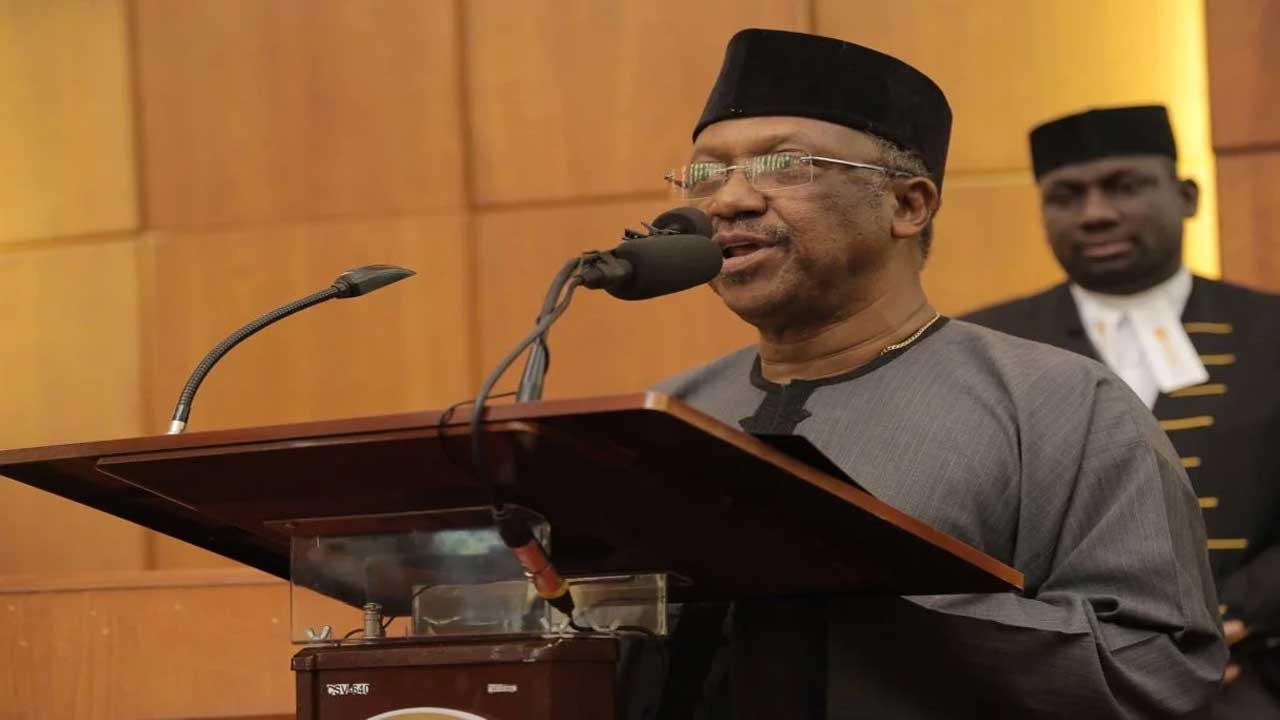Headlines
Nigeria, Others Losing $95bn in Productivity Due to Unsafe Food Intake

By Derrick Bangura
Nigeria’s federal government has said consumption of unsafe or contaminated food was causing the country and other low income economies estimated $95 billion in productivity decline.
The Minister of Health, Dr. Osagie Ehanire who spoke at this year’s World Food Safety Day in Abuja, on Tuesday, said the public health burden due to food borne diseases was comparable to malaria and HIV-AIDS.
“Unsafe food hinders development especially on low and middle Income economies which lose around $95 billion in productivity associated with illness, disability and premature death suffered by workers,” he said.
Speaking on the diseases resulting from in-take of contaminated food, Ehanire said over 200 diseases were caused by unsafe food consumption.
According to the minister, the magnitude of the public health burden due to food borne diseases was comparable to malaria and HIV-AIDS, adding that under five-year children were higher at risk of malnutrition and mortality due to unsafe food consumption.
He also said the children share about 40 per cent of the food borne disease burden.
“Unsafe food causes one in every six deaths from diarrhea, a major killer of children of the age group,” he said.
He said the World Food Safety Day provided an opportunity to raise awareness about the dangers of unsafe food, government, producers, handlers and consumers having a role to play in making food safe.
On her part, the Director General, National Agency for Food and Drug Administration and Control, (NAFDAC), Prof. Mojisola Adeyeye, urged Nigerians to always ensure that only safe, and wholesome food were consumed to boost immunity and improve the body’s natural defenses in fighting diseases.
She said Nigerians do not need medicines if they eat right, stressing that eating right means making healthy food choices from safe, wholesome, and nutritious foods.
Adeyeye said this during NAFDAC’s celebration of the fourth World Food Safety Day 2022 with the theme: “Safer Food, Better Health,” where she opined that where food is unsafe, “our nutritional goals cannot be achieved.”
In a statement signed by the Resident Media Consultant to NAFDAC, Sayo Akintola, Adeyeye was quoted as saying that safe food was an essential component of sustainable development and contributes towards improvement of public health, poverty reduction, and increased food security.
She noted that the theme for this year was very apt, as the world gradually returns to normal with the COVID-19 pandemic having lost its firm grip on the world.
“You all know my popular saying about not needing medicine if one eats right. Eating right means making healthy food choices from safe, wholesome, and nutritious foods,” she added.
She stressed that the occasion of World Food Safety Day was an opportunity to create and generate awareness around food safety and situate it as a very significant issue of public health concern, especially in the light of safe, wholesome food being important for boosting immunity and improving the body’s natural defenses in fighting diseases.
“The theme Safer Food, Better Health is very relevant to us here in Nigeria as a large proportion of the foods we consume are produced by micro- and small-scale producers; these include our smallholder farmers, street food vendors, the traditional, open food markets,” she added.
The NAFDAC boss however, noted with dismay that their activities were of concern regarding safe food practices or lack of it.
She added that the foods are frequently exposed to less than hygienic and sanitary conditions, resulting in contamination and leading to incidences and outbreaks of foodborne diseases, situations that are steadily becoming significant food safety concerns.
The NAFDAC boss disclosed that unsafe foods are the cause of many diseases and contribute to other poor health conditions, such as impaired growth and development.
“We know that food safety is a shared responsibility, and everyone has a role to play in ensuring we have safer food for better health: from growers to processors, to transporters, sellers, buyers, and those who prepare or serve food.
“Policy makers, educational institutions and workplaces, as well as consumers are not left out; food safety is the responsibility of all. We must all work together to help achieve safer food for better health,” she added.
She urged policy makers and food regulators to design all public procurement of food, such as food aid, school feeding and other publicly owned food outlets, so that consumers can access safe and healthy foods.
She added that they should support policy measures and legal frameworks to strengthen the national food safety system and ensure it complies with food safety standards and regulations.
Headlines
Noble Ladies Champion Women’s Financial Independence at Grand Inauguration in Abuja

Women from diverse backgrounds across Nigeria and beyond gathered at the Art and Culture Auditorium, Abuja, for the inauguration and convention of the Noble Ladies Association. The event, led by the association’s Founder and “visionary and polished Queen Mother,” Mrs. Margaret Chigozie Mkpuma, was a colourful display of feminine elegance, empowerment, and ambition.
The highly anticipated gathering, attended by over 700 members and counting, reflected the association’s mission to help women realise their potential while shifting mindsets away from dependency and over-glamorization of the ‘white collar job.’ According to the group, progress can be better achieved through innovation and creativity. “When a woman is able to earn and blossom on her own she has no reason to look at herself as a second fiddle,” the association stated.
One of the association’s standout initiatives is its women-only investment platform, which currently offers a minimum entry of ₦100,000 with a return of ₦130,000 over 30 days—an interest rate of 30 percent. Some members invest as much as ₦1 million, enjoying the same return rate. Mrs. Mkpuma explained that the scheme focuses on women because “women bear the greater brunt of poverty” and the platform seeks “to offer equity in the absence of economic equality.”
Education is also central to the Noble Ladies’ mission, regardless of age. Their mantra, “start again from where you stopped,” encourages women to return to school or upgrade their skills at any stage in life. The association believes that financial stability is vital in protecting women from cultural practices that dispossess widows of their late husbands’ assets, while also enabling them to raise morally and socially grounded families.
Founded on the vision of enhancing women’s skills and achieving financial stability, the association rests on a value system that discourages pity and promotes purpose. “You have a purpose and you build on that purpose to achieve great potentials and emancipation,” Mrs. Mkpuma said.
A criminologist by training and entrepreneur by practice, she cautions against idleness while waiting for formal employment. “There are billions in the informal and non-formal sectors waiting to be made,” she said, rejecting the “new normal of begging” and urging people to “be more introspective to find their purpose in life and hold on to it.”
Mrs. Mkpuma’s management style keeps members actively engaged, focusing on vocational skills and training to prepare them for competitive markets. She is exploring “innovative integration of uncommon technologies” and is already in talks with international franchises to invest in Nigeria, with Noble Ladies as first beneficiaries.
The association’s core values include mutual respect, innovation, forward-thinking, equal opportunity, and financial emancipation. With plans underway to establish a secretariat in the heart of Abuja, the group aims to expand its impact.
The event drew high-profile guests, including former Inspector General of Police, Mike Okiro, and a host of VIPs, marking a significant milestone in the association’s drive for women’s empowerment.
Headlines
NEPZA, FCT agree to create world-class FTZ environment

The Nigeria Export Processing Zones Authority (NEPZA) has stepped in to resolve the dispute between the Federal Capital Territory Administration and the Abuja Technology Village (ATV), a licensed Free Trade Zone, over the potential revocation of the zone’s land title.
Dr. Olufemi Ogunyemi, the Managing Director of NEPZA, urged ATV operators and investors to withdraw the lawsuit filed against the FCT administration immediately to facilitate a roundtable negotiation.
Dr. Ogunyemi delivered the charge during a courtesy visit to the Minister of the Federal Capital Territory, Barrister Nyesom Wike, on Thursday in Abuja.
You will recall that the ATV operators responded to the revocation notice issued by the FCT administration with a lawsuit.
Dr. Ogunyemi stated that the continued support for the growth of the Free Trade Zones Scheme would benefit the nation’s economy and the FCT’s development, emphasizing that the FCT administration recognized the scheme’s potential to accelerate industrialisation.
Dr. Ogunyemi, also the Chief Executive Officer of NEPZA, expressed his delight at the steps taken by the FCT minister to expand the economic frontier of the FCT through the proposed Abuja City Walk (ACW) project.
Dr. Ogunyemi further explained that the Authority was preparing to assess all the 63 licensed Free Trade Zones across the country with the view to vetting their functionality and contributions to the nation’s Foreign Direct Investment and export drives.
“I have come to discuss with His Excellency, the Minister of the Federal Capital Territory on the importance of supporting the ATV to succeed while also promoting the development of the Abuja City Walk project. We must work together to achieve this for the good of our nation,” he said.
On his part, the FCT Minister reiterated his unflinching determination to work towards President Bola Ahmed Tinubu’s Renewed Hope Agenda by bringing FDI to the FCT.
“We must fulfil Mr. President’s promises regarding industrialization, trade, and investment. In this context, the FCT will collaborate with NEPZA to review the future of ATV, a zone that was sponsored and supported by the FCT administration,” Wike said.
Barrister Wike also said that efforts were underway to fast-track the industrialisation process of the territory with the construction of the Abuja City Walk.
The minister further said the Abuja City Walk project was planned to cover over 200 hectares in the Abuja Technology Village corridor along Airport Road.
According to him, the business ecosystem aimed to create a lively, mixed-use urban center with residential, commercial, retail, hospitality, medical, and institutional facilities.
He added that the ACW would turn out to be a high-definition and world-class project that would give this administration’s Renewed Hope Agenda true meaning in the North-Central Region of the country.
Barrister Wike also indicated his continued pursuit of land and property owners who failed to fulfil their obligations to the FCT in his determination to develop the territory.
Headlines
Benue IDPs block highway, demand return to ancestral homes

Vehicular movement along the Yelwata axis of the Benue–Nasarawa highway was brought to a standstill on Wednesday as Internally Displaced Persons, IDPs, staged a protest, demanding immediate return to their ancestral homes.
The protesters, believed to be victims of persistent attacks by suspected herdsmen, blocked both lanes of the busy highway for several hours, chanting “We want to go back home”.
The protest caused disruption, leaving hundreds of motorists and passengers stranded.
Eyewitnesses said the displaced persons, many of whom have spent years in overcrowded IDP camps, are expressing deep frustration over the government’s delay in restoring security to their communities.
“We have suffered enough. We want to return to our homes and farms,” one of the protesters told reporters at the scene.
Security personnel were reportedly deployed to monitor the situation and prevent any escalation, though tensions remained high as of press time.
Efforts to reach the Benue State Emergency Management Agency, SEMA, and other relevant authorities for comment were unsuccessful.
-

 Headlines4 years ago
Headlines4 years agoFacebook, Instagram Temporarily Allow Posts on Ukraine War Calling for Violence Against Invading Russians or Putin’s Death
-

 Headlines4 years ago
Headlines4 years agoNigeria, Other West African Countries Facing Worst Food Crisis in 10 Years, Aid Groups Say
-

 Foreign4 years ago
Foreign4 years agoNew York Consulate installs machines for 10-year passport
-

 News1 year ago
News1 year agoZero Trust Architecture in a Remote World: Securing the New Normal
-

 Entertainment3 years ago
Entertainment3 years agoPhyna emerges winner of Big Brother Naija Season 7
-

 Headlines1 year ago
Headlines1 year agoNigeria Customs modernisation project to check extortion of traders
-

 Entertainment2 years ago
Entertainment2 years agoMovie download platform, Netnaija, announces closure
-

 Economy2 years ago
Economy2 years agoWe generated N30.2 bn revenue in three months – Kano NCS Comptroller














